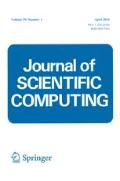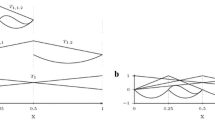Abstract
Solutions of many practical problems involve several components which have different natures and/or different locations of singularity. As a result, a single mesh may not be able to achieve satisfactory adaptation result. In this paper, a new adaptive mesh implementation strategy using multiple meshes is developed, which is especially useful for problems whose solution components exhibit different singularity behaviors. We describe the basic ideas and ingredients of the multi-mesh adaptive methods. Numerical results for solving partial differential equations and optimal control problems are presented to demonstrate the advantages of the multi-mesh approach
Similar content being viewed by others
References
M. Ainsworth B. Senior (1997) ArticleTitleAspects of an adaptive hp-finite element method: Adaptive strategy, conforming approximation and efficient solvers Comput. Methods Appl. Mech. Eng. 150 65–87 Occurrence Handle10.1016/S0045-7825(97)00101-1
I. Babuska W. Rheinboldt (1978) ArticleTitleError estimates for adaptive finite element computations SIAM J. Numer. Anal. 15 736–754 Occurrence Handle10.1137/0715049
Bangerth W., Kanschat G. (1999). Concepts for object-oriented finite element software – the deal II library Preprint 99–43, Sonderforschungbereich 3–59, IWR, University of Heidelberg
Bangerth W., Kanschat, G. (1999). deal II Differential Equations Analysis LibraryTechnical Reference, http://www.dealii.org/ or http://gaia.iwr.uni-heidelberg.de/~deal
P. Bastian K. Birken K. Johannsen S. Lang N. Neub H. Rentz-Reichert C. Wieners (1997) UG A flexible software toolbox for solving partial differential equations Computing and Visualization in Science 1 27–40
Z. Chen R.H. Nochetto (2000) ArticleTitleResidual type a posteriori error estimates for elliptic obstacle problems Numer. Math. 84 527–548 Occurrence Handle10.1007/s002110050009
Huang Y.-Q., Li R., Liu W.-B., Yan N.-N. (2003). Efficient discretization for finite element approximation of constrained optimal control problems. submitted to SIAM J. Control Optimization
B. Heimsund X.-C. Tai J.-P. Wang (2002) ArticleTitleSuperconvergence for the gradient of finite element approximations by L2-projections SIAM J. Numer. Anal. 40 1263–1280 Occurrence Handle10.1137/S003614290037410X
D.W. Kelly J.P. De S.R. Gago O.C. Zienkiewicz I. Babuska (1983) ArticleTitleA posteriori error analysis and adaptive processes in the finite element method: Part I-Error analysis Int. J. Numer. Meth. Eng. 19 1593–1619 Occurrence Handle10.1002/nme.1620191103
R. Li W.-B. Liu H.-P. Ma T. Tang (2002) ArticleTitleAdaptive Finite element approximation for distributed elliptic optimal control problems SIAM J. Optimization, and Control 41 1321–1349
R. Li P.-W. TangT. Zhang (2001) ArticleTitleMoving mesh methods in multiple dimensions based on harmonic maps J. Comput. Phys. 170 562–588 Occurrence Handle10.1006/jcph.2001.6749
W.B. Liu H.P. Ma T. Tang (2001) ArticleTitleOn mixed error estimates for elliptic obstacle problems Adv. Comput. Math. 15 261–283 Occurrence Handle10.1023/A:1014261013164
K. Miller R.N. Miller (1981) ArticleTitleMoving finite element methods I SIAM J. Numer. Anal. 18 1019–1032 Occurrence Handle10.1137/0718070
Schmidt A., Siebert K.G. (2000). ALBERT An adaptive hierarchical finite element toolbox. Preprint 06/2000, University of Freiburg. http://www.mathemtik.uni-freiburg.de/IAM/ALBERT
R. Verfurth (1996) A Review of a Posteriori Error Estimation and Adaptive Mesh- Refinement Techniques Wiley-Teubner Stuttgart
Author information
Authors and Affiliations
Corresponding author
Rights and permissions
About this article
Cite this article
Li, R. On Multi-Mesh H-Adaptive Methods. J Sci Comput 24, 321–341 (2005). https://doi.org/10.1007/s10915-004-4793-5
Received:
Accepted:
Published:
Issue Date:
DOI: https://doi.org/10.1007/s10915-004-4793-5




